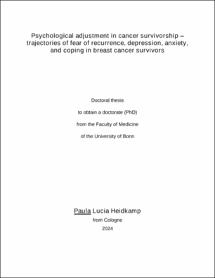Heidkamp, Paula Lucia: Psychological adjustment in cancer survivorship – trajectories of fear of recurrence, depression, anxiety, and coping in breast cancer survivors. - Bonn, 2024. - Dissertation, Rheinische Friedrich-Wilhelms-Universität Bonn.
Online-Ausgabe in bonndoc: https://nbn-resolving.org/urn:nbn:de:hbz:5-79729
Online-Ausgabe in bonndoc: https://nbn-resolving.org/urn:nbn:de:hbz:5-79729
@phdthesis{handle:20.500.11811/12549,
urn: https://nbn-resolving.org/urn:nbn:de:hbz:5-79729,
author = {{Paula Lucia Heidkamp}},
title = {Psychological adjustment in cancer survivorship – trajectories of fear of recurrence, depression, anxiety, and coping in breast cancer survivors},
school = {Rheinische Friedrich-Wilhelms-Universität Bonn},
year = 2024,
month = nov,
note = {Breast cancer (BC) is the most common cancer among women in Germany. Screening programs and treatment advances have increased these patients’ chance of early diagnosis and survival rates. Therefore, the topic of cancer survivorship (CS) has gained importance. While high levels of psychological distress are well documented for patients with cancer during diagnosis and treatment, there is a lack of research on psychological outcomes in long-term cancer survivors. This study aimed to gain a better understanding of psychological adjustment over the course of BC survivorship and to discuss patient-centeredness in the provision of psycho-oncological healthcare for CSs. To achieve this, the following research questions were addressed: (1) How do BC survivors (BCSs) experience fear of cancer recurrence (FoR), depression and anxiety over the course of CS? (2) How do BCSs cope with challenges in the context of CS? (3) Which factors are associated with FoR, depression, anxiety and coping in BC survivorship? To answer these questions, quantitative and qualitative data for three publications were obtained from female BC survivors within the mixed-methods B-CARE project (“breast cancer patients’ return to work”). Quantitative data consisted of longitudinal survey data from four measurement time points, namely, during hospitalization (T1) and 10 weeks (T2), 40 weeks (T3), and 5–6 years after hospital discharge (T4), and were analyzed using descriptive statistics and regression models. Qualitative data were obtained through semi-structured interviews conducted 5–6 years after hospital discharge and were analyzed trough qualitative content analysis. The results indicated that (1) BCSs experienced significant levels of FoR, depression and anxiety even 5–6 years after hospital discharge, with FoR decreasing and depression and anxiety increasing over time; (2) BCSs employed approach- and avoidance-orientated coping strategies during medical and occupational rehabilitation to deal with the consequences of cancer; and (3) psychological distress and coping in BCSs were associated in sociodemographic, personal, treatment, and health-related variables. The results show the long-term adverse mental effects of cancer and its treatment and highlight the individual adaptation requirements of CSs. The findings indicate the need for more patient-centeredness in the provision of psycho-oncological healthcare for long-term CSs.},
url = {https://hdl.handle.net/20.500.11811/12549}
}
urn: https://nbn-resolving.org/urn:nbn:de:hbz:5-79729,
author = {{Paula Lucia Heidkamp}},
title = {Psychological adjustment in cancer survivorship – trajectories of fear of recurrence, depression, anxiety, and coping in breast cancer survivors},
school = {Rheinische Friedrich-Wilhelms-Universität Bonn},
year = 2024,
month = nov,
note = {Breast cancer (BC) is the most common cancer among women in Germany. Screening programs and treatment advances have increased these patients’ chance of early diagnosis and survival rates. Therefore, the topic of cancer survivorship (CS) has gained importance. While high levels of psychological distress are well documented for patients with cancer during diagnosis and treatment, there is a lack of research on psychological outcomes in long-term cancer survivors. This study aimed to gain a better understanding of psychological adjustment over the course of BC survivorship and to discuss patient-centeredness in the provision of psycho-oncological healthcare for CSs. To achieve this, the following research questions were addressed: (1) How do BC survivors (BCSs) experience fear of cancer recurrence (FoR), depression and anxiety over the course of CS? (2) How do BCSs cope with challenges in the context of CS? (3) Which factors are associated with FoR, depression, anxiety and coping in BC survivorship? To answer these questions, quantitative and qualitative data for three publications were obtained from female BC survivors within the mixed-methods B-CARE project (“breast cancer patients’ return to work”). Quantitative data consisted of longitudinal survey data from four measurement time points, namely, during hospitalization (T1) and 10 weeks (T2), 40 weeks (T3), and 5–6 years after hospital discharge (T4), and were analyzed using descriptive statistics and regression models. Qualitative data were obtained through semi-structured interviews conducted 5–6 years after hospital discharge and were analyzed trough qualitative content analysis. The results indicated that (1) BCSs experienced significant levels of FoR, depression and anxiety even 5–6 years after hospital discharge, with FoR decreasing and depression and anxiety increasing over time; (2) BCSs employed approach- and avoidance-orientated coping strategies during medical and occupational rehabilitation to deal with the consequences of cancer; and (3) psychological distress and coping in BCSs were associated in sociodemographic, personal, treatment, and health-related variables. The results show the long-term adverse mental effects of cancer and its treatment and highlight the individual adaptation requirements of CSs. The findings indicate the need for more patient-centeredness in the provision of psycho-oncological healthcare for long-term CSs.},
url = {https://hdl.handle.net/20.500.11811/12549}
}






